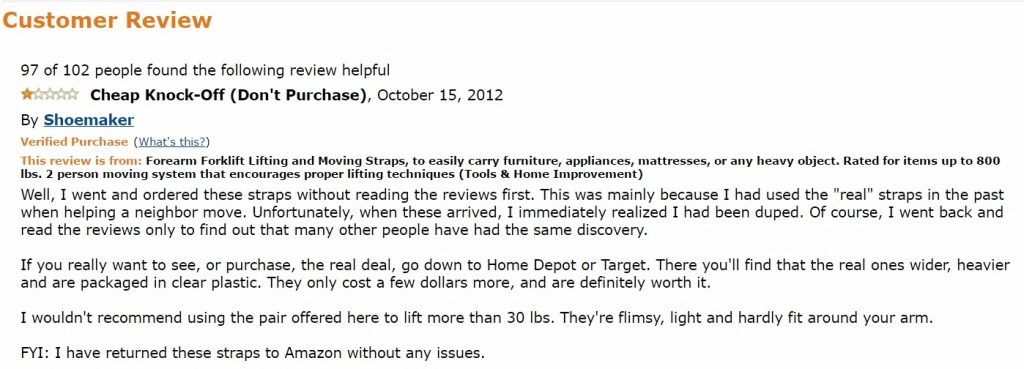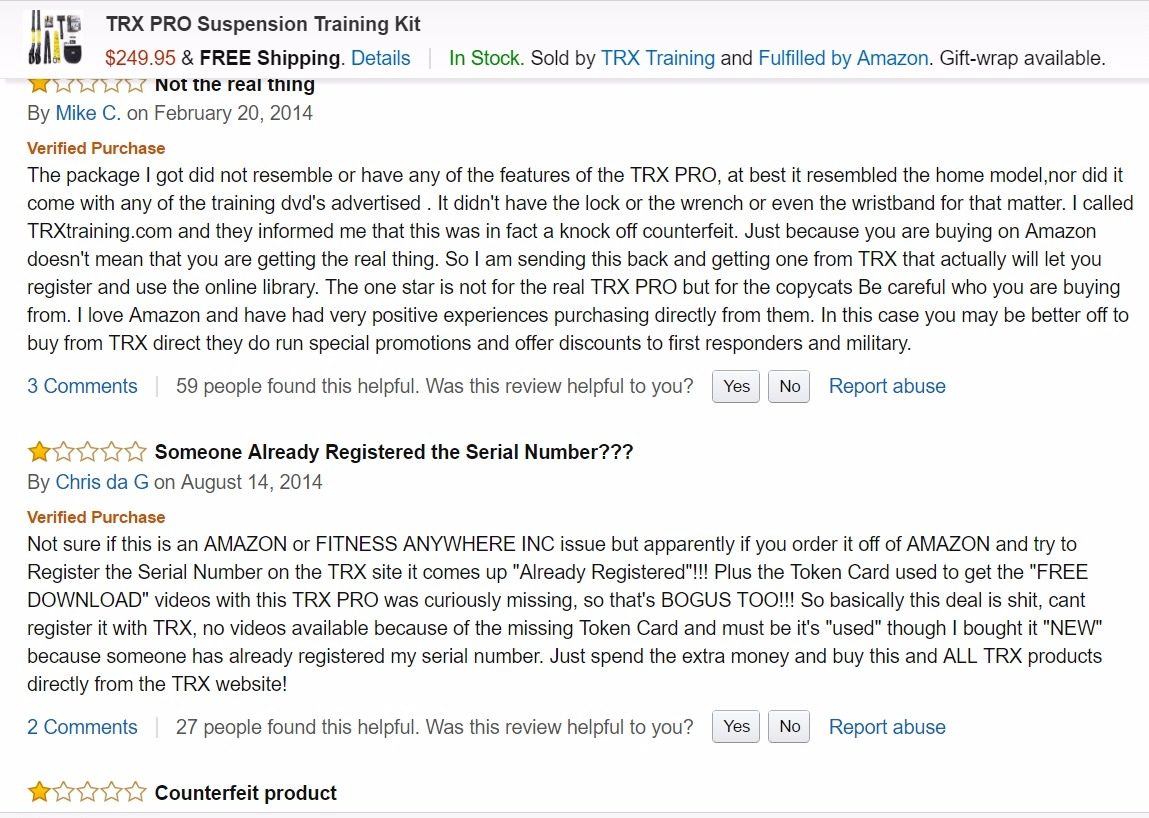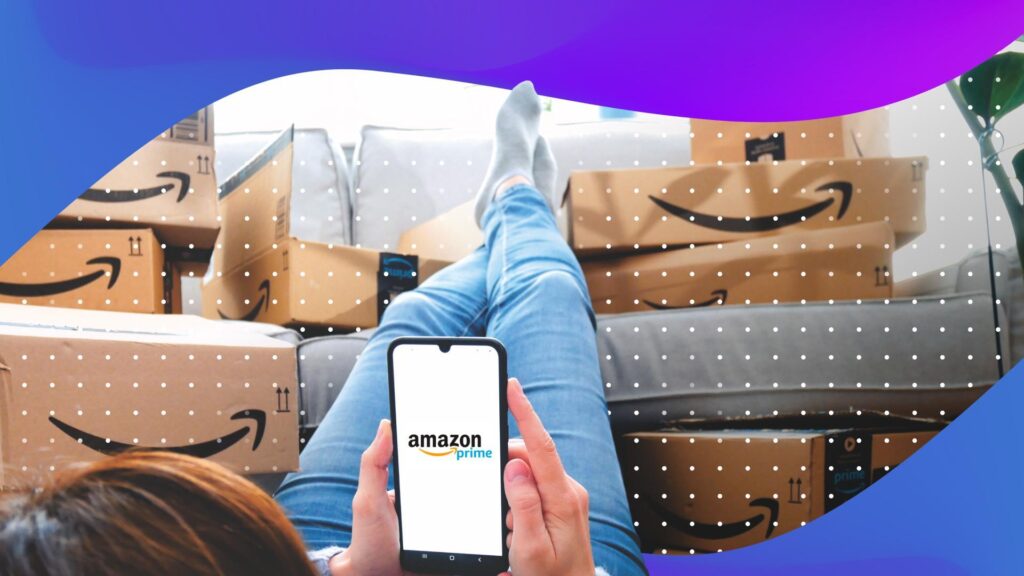On Monday, Amazon filed a lawsuit against several sellers and companies in Florida, New York, and California who were involved in selling counterfeit exercise products and furniture moving equipment.
The accused sellers marketed and sold counterfeit goods on Amazon and infringed on the intellectual property rights of TRX and Above All Co. Corp.
The counterfeiters who infringed on Above All Co. Corp, in particular, added insult to injury when they allegedly produced a forged invoice for Amazon after they were initially flagged and blocked from selling.
Here’s what Amazon said in the court document:
Amazon has zero tolerance for counterfeits, and has invested heavily in protecting the integrity of the Amazon marketplace for consumers, sellers, and manufacturers. Amazon’s anti-counterfeiting policy clearly prohibits the sale of counterfeit products: “The sale of counterfeit products, including any products that have been illegally replicated, reproduced, or manufactured, is strictly prohibited.”
You don’t have to look hard to find negative reviews indicating counterfeits on these listings. Check out this review we found for an Above All Co. Corp moving strap:

There were also plenty of presumably undeserved negative reviews to be found on the TRX Pro Suspension Training Kit:

Amazon hasn’t removed these negative reviews, and we’re not sure if they will. However, we noticed TRX was able to comment back to one of these reviews and explain the situation, which should help clear some doubts. (More on that later.)
Earlier this year, many brands–most notably, Birkenstock–questioned Amazon’s dedication to brand protection. Concerns about an Amazon counterfeit problem grew when sellers noticed an increase in knockoffs in 2016.
It’s worth noting that not all knockoffs are knowingly sold. CJ Rosenbaum, a lawyer who has experience representing sellers who have wrongly been accused of producing counterfeits, explains:
“The majority of sellers I’ve represented are selling genuine products. They don’t want counterfeits. They could get the real goods for the same price–there’s no extra money to be made selling counterfeits.
Problems arise when they’re unknowingly sold a bad batch of products or they’re commingling inventory, which the seller can’t control. The Amazon platform is so important to them, and they don’t want to jeopardize that.”
But the counterfeiters Amazon just sued were certainly aware of what they were doing, says Rosenbaum.
“It’s about time that Amazon, which has all the power and resources behind it, is going after real counterfeiters,” says Rosenbaum. “Counterfeiters hurt everybody–the small businesses, the consumer–Amazon has the capability to do something about it.”
In the court document, Amazon makes it clear that they spend “tens of millions of dollars annually” on sophisticated systems and diagnostic expertise to weed out the counterfeiters.
This isn’t the only move Amazon’s made recently to regain control of their marketplace.
 “Amazon has in the past sued sellers for buying fake reviews and the services offering those reviews,” says Pat Petriello, Senior Marketplace Analyst at CPC Strategy points out.
“Amazon has in the past sued sellers for buying fake reviews and the services offering those reviews,” says Pat Petriello, Senior Marketplace Analyst at CPC Strategy points out.
“Suing counterfeiters represents another tactic in a larger cleanup of the marketplace to restore consumer trust and discourage bad actors.”
We wrote about some of these positive changes earlier in the year:
- Amazon Brand Gating: Amazon requires up to a $1500 fee, a letter of approval for sale from the manufacturer, and recent invoices for sellers of certain restricted brands, which limits unauthorized or small resellers on a listing.
- Amazon Incentivized Review Ban: Amazon bans and eliminates reviews that are written in exchange for discounted or free goods, which are shown by ReviewMeta’s study to be more biased than normal reviews (and could be fake).
- Amazon Gives Vendors the Ability to Comment on Customer Reviews: As we saw with TRX, vendors can now directly communicate with customers via comments on reviews and provide answers under Q&A. This is incredibly valuable for customer service purposes.
While these are great developments, we anticipate there will be challenges moving forward.
Jeff Coleman, VP of Marketplace Channels at CPC Strategy, shares his thoughts:
“While I’m happy they’re allocating resources to policing counterfeiters, I’d be shocked if US-based counterfeiters made up a significant percentage of fake goods on Amazon.
Unless & until they can target manufacturers in Asia, their effectiveness here is going to be extremely limited. That said, I do believe that the Brand Gating initiative could largely solve the counterfeit problem if they give brands more leeway to police & prevent unauthorized sellers & counterfeiters on their own.
The challenge for Amazon with that program is that unauthorized resellers, if they’re selling legitimate product, can actually benefit the consumer if those resellers are offering a lower price. Amazon is going to have to balance protecting brands with maximizing value to the consumer. Counterfeiters are bad for everybody so that’s an easy bucket of sellers to target, but the Brand Gating program can also cut out sellers selling legitimate products, which Amazon doesn’t want to do.”
Wondering how the lawsuit publicity will affect Amazon sales heading into Q4?
Amazon stated that the they “[have] suffered, is suffering, and will continue to suffer invasion of its statutory, common law, and contractual rights due to Defendants’ wrongful conduct.”
While this may be partially true, this shouldn’t turn off sellers from buying on Amazon. Petriello believes this is further proof to customers that Amazon has their best interest in mind leading into the holidays.
“The vast majority of customers still won’t ever know any of this is happening,” says Petriello.”It would be similar to your bank saying they are adding an extra layer of fraud protection to your account and you don’t have to do anything. You’re going to feel good about that and happy your bank is looking after you.”
These lawsuits and other developments may not permanently banish counterfeiters, but they indicate that Amazon’s taking steps in the right direction.
Update 9/6/2017: Amazon is testing “Transparency by Amazon”, a program described as a “counterfeit prevention service.” Only select brands have been invited to participate, but by 2017, there could be up to 100 brands enrolled in the program. Here’s how the program is currently being described:
Transparency is a new counterfeit prevention service being offered by Amazon which leverages track and trace features and was launched in 2016. Transparency prevents counterfeit items from entering the Amazon fulfilment center network and provides a consumer experience (through the Transparency-branded app) that gives customers the assurance the item they purchased is authentic, whether purchased from Amazon or through another channel.
This is great news for brands who hesitate to put their products on Amazon due to concerns about counterfeit issues, and early invitees have already reported “higher customer satisfaction (reducing negative reviews), higher ASP and higher seller satisfaction.”
You Might Be Interested In












